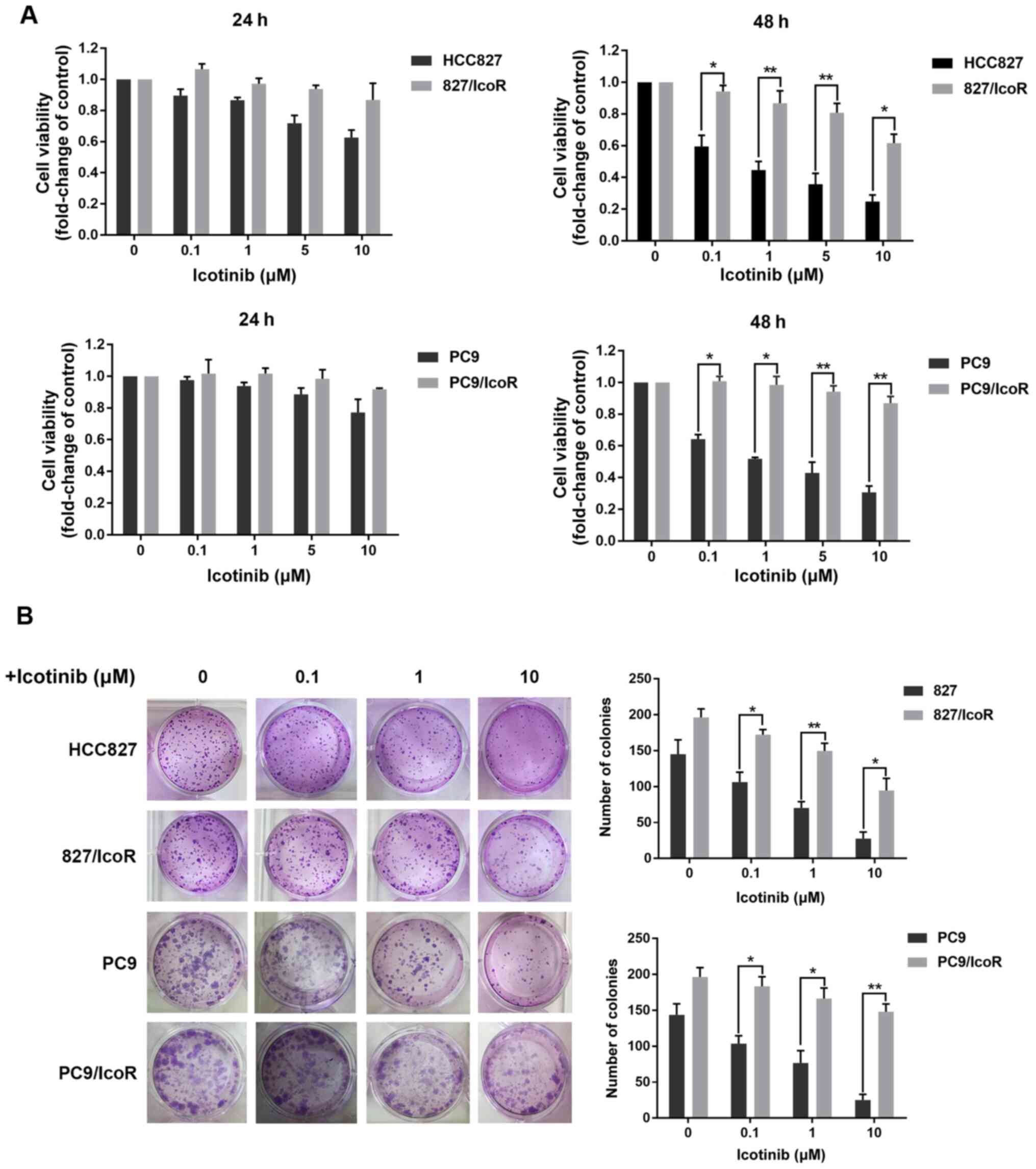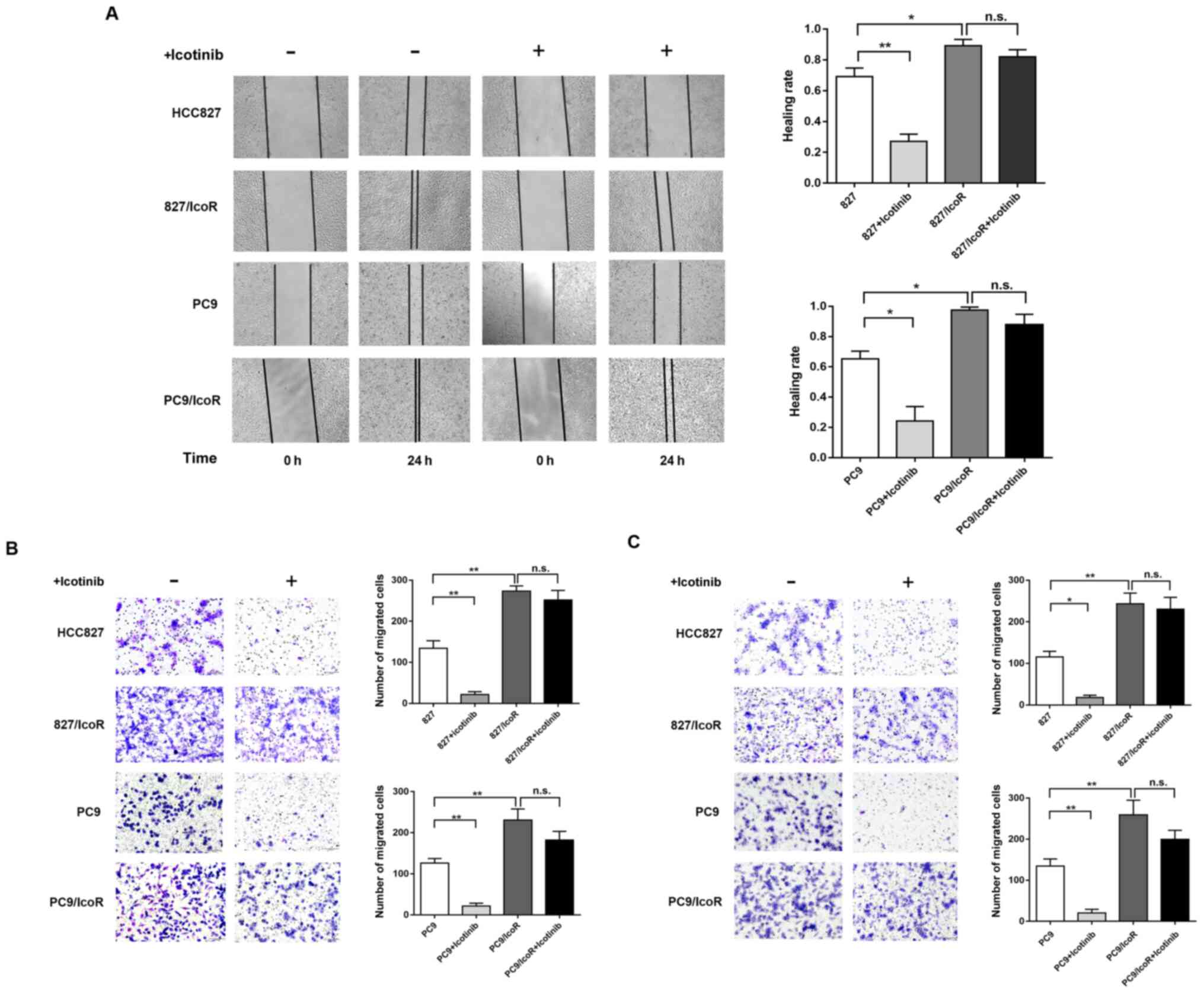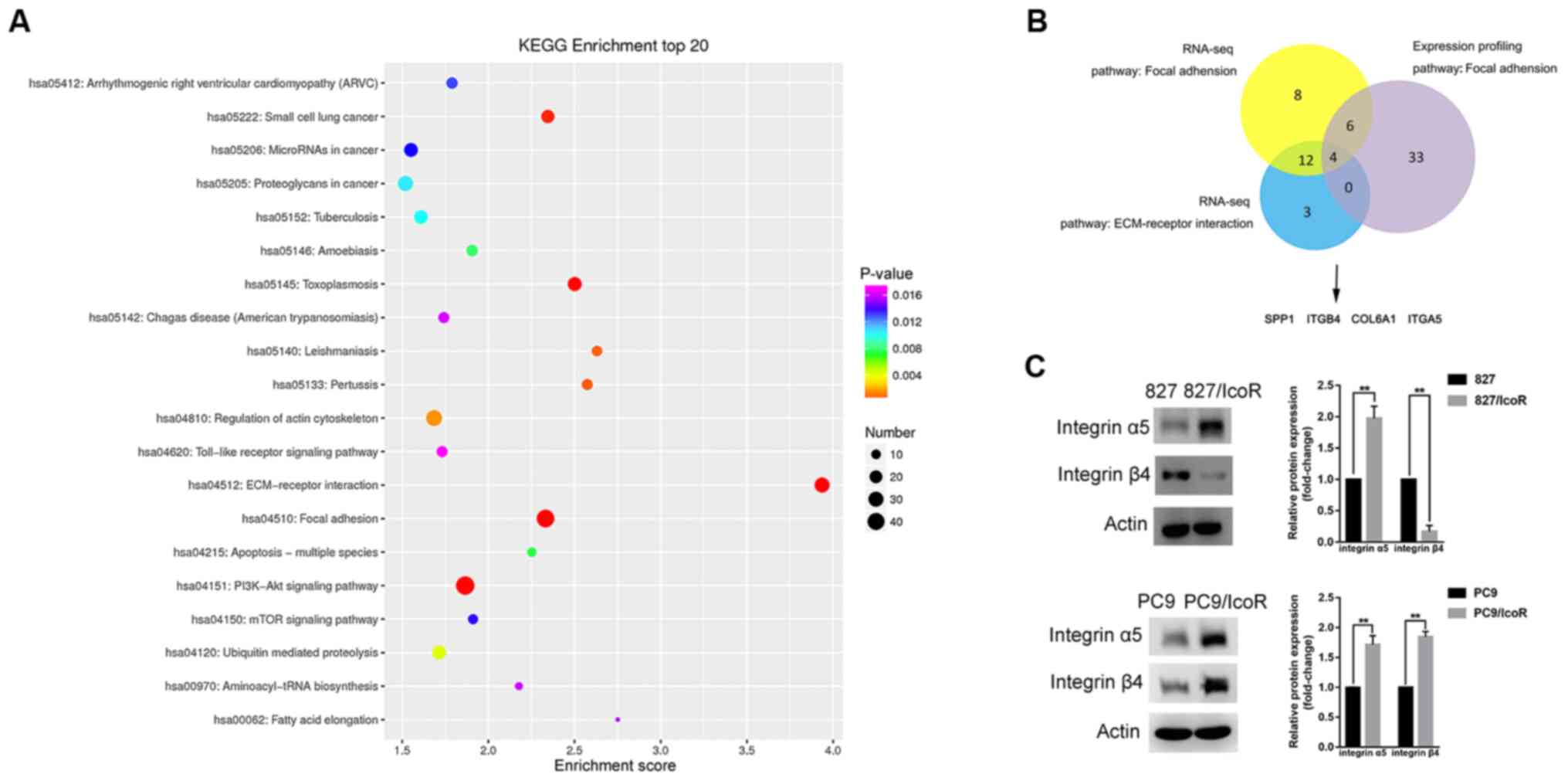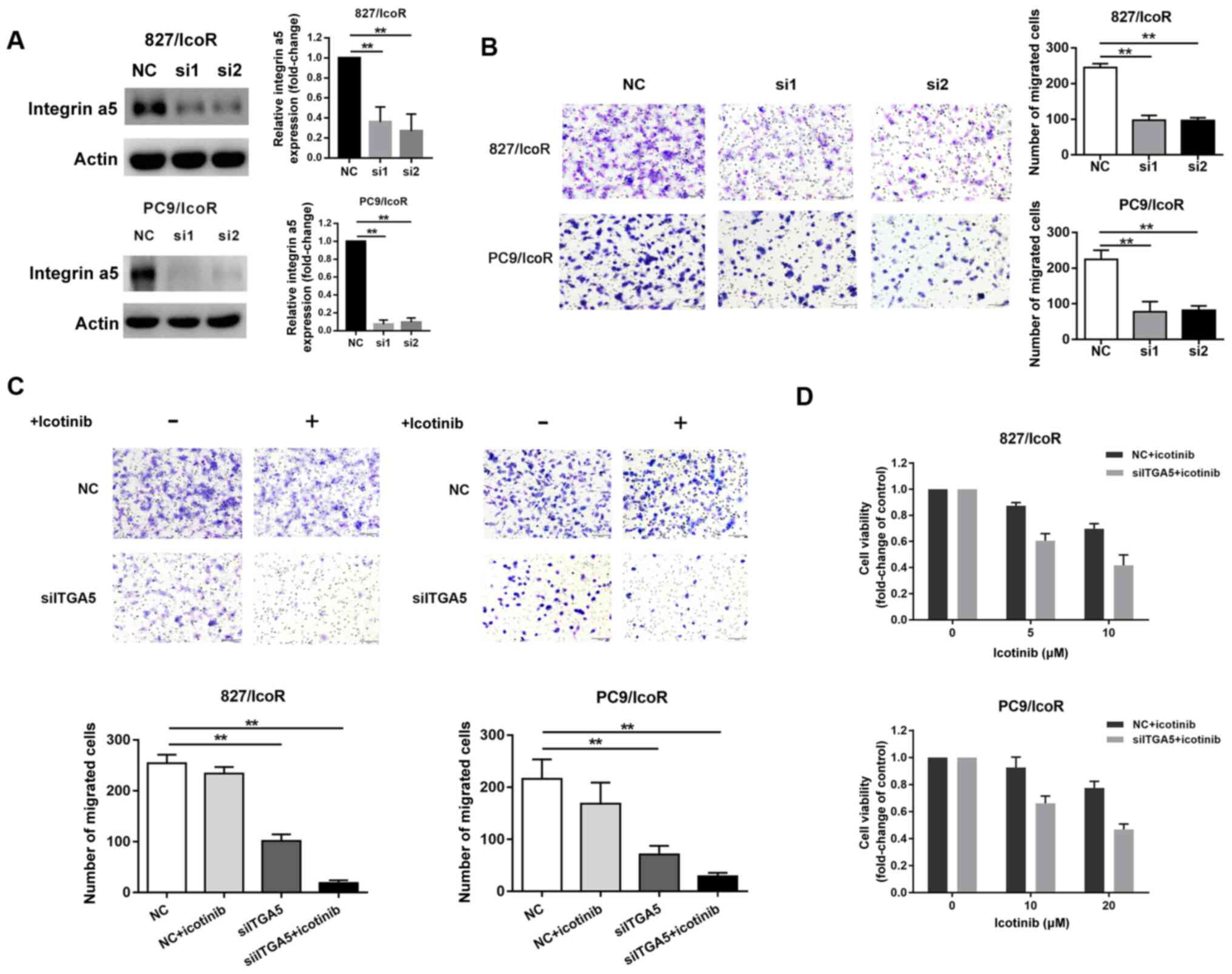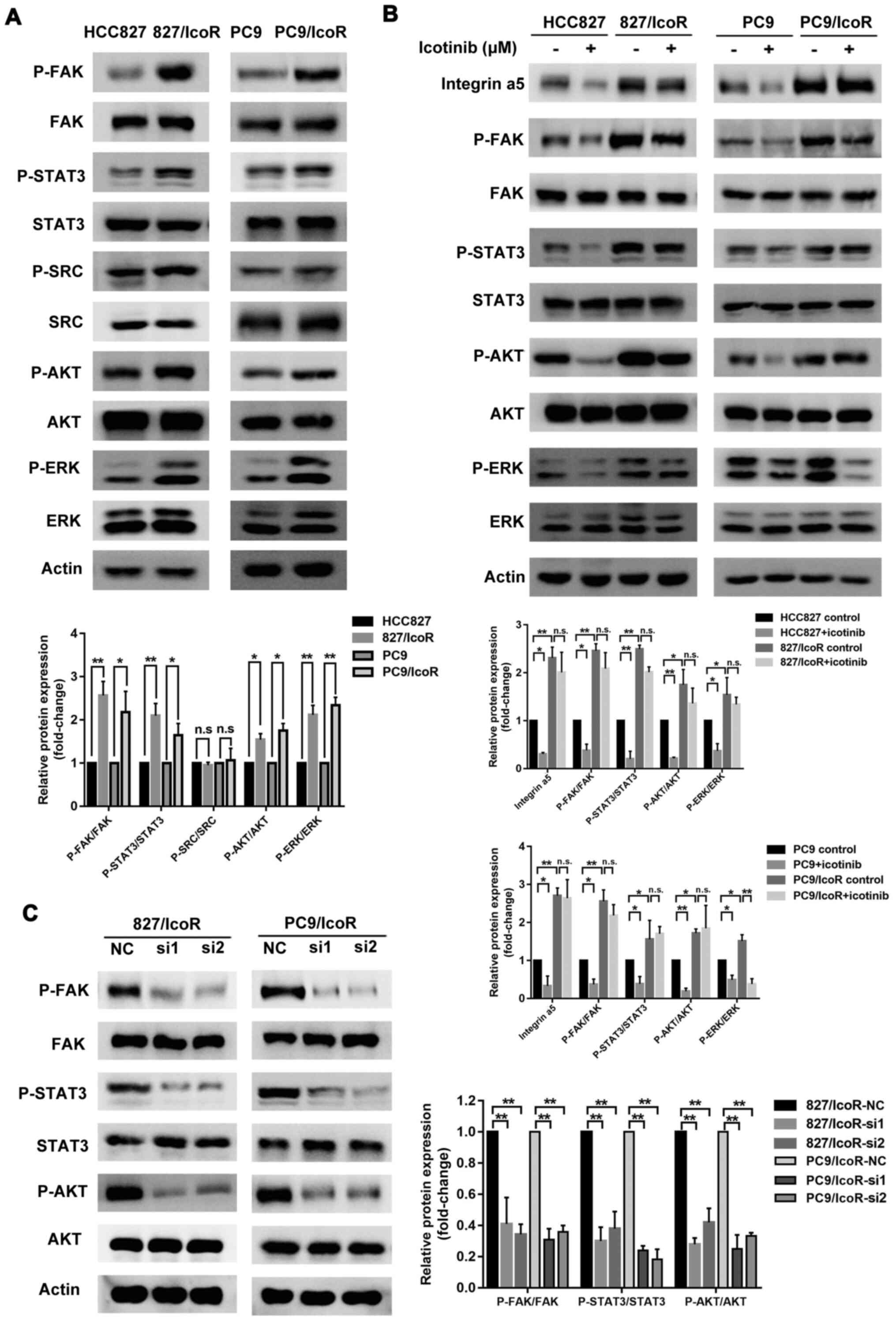|
1
|
Mattiuzzi C and Lippi G: Current cancer
epidemiology. J Epidemiol Glob Health. 9:217–222. 2019. View Article : Google Scholar : PubMed/NCBI
|
|
2
|
Mathers CD and Loncar D: Projections of
global mortality and burden of disease from 2002 to 2030. PLoS Med.
3:e4422006. View Article : Google Scholar : PubMed/NCBI
|
|
3
|
Bade BC and Dela Cruz CS: Lung cancer
2020: Epidemiology, etiology, and prevention. Clin Chest Med.
41:1–24. 2020. View Article : Google Scholar : PubMed/NCBI
|
|
4
|
Herbst RS, Heymach JV and Lippman SM: Lung
cancer. N Engl J Med. 359:1367–1380. 2008. View Article : Google Scholar : PubMed/NCBI
|
|
5
|
McGuire S: World Cancer Report 2014.
Geneva, Switzerland: World Health Organization, International
Agency for Research on Cancer, WHO Press, 2015. Adv Nutr.
7:418–419. 2016. View Article : Google Scholar : PubMed/NCBI
|
|
6
|
Zhou C, Wu YL, Chen G, Feng J, Liu XQ,
Wang C, Zhang S, Wang J, Zhou S, Ren S, et al: Erlotinib versus
chemotherapy as first-line treatment for patients with advanced
EGFR mutation-positive non-small-cell lung cancer (OPTIMAL,
CTONG-0802): A multicentre, open-label, randomised, phase 3 study.
Lancet Oncol. 12:735–742. 2011. View Article : Google Scholar : PubMed/NCBI
|
|
7
|
Keedy VL, Temin S, Somerfield MR, Beasley
MB, Johnson DH, McShane LM, Milton DT, Strawn JR, Wakelee HA and
Giaccone G: American society of clinical oncology provisional
clinical opinion: Epidermal growth factor receptor (EGFR) Mutation
testing for patients with advanced non-small-cell lung cancer
considering first-line EGFR tyrosine kinase inhibitor therapy. J
Clin Oncol. 29:2121–2127. 2011. View Article : Google Scholar : PubMed/NCBI
|
|
8
|
Han SW, Kim TY, Hwang PG, Jeong S, Kim J,
Choi IS, Oh DY, Kim JH, Kim DW, Chung DH, et al: Predictive and
prognostic impact of epidermal growth factor receptor mutation in
non-small-cell lung cancer patients treated with gefitinib. J Clin
Oncol. 23:2493–2501. 2005. View Article : Google Scholar : PubMed/NCBI
|
|
9
|
Somaiah N, Fidler MJ, Garrett-Mayer E,
Wahlquist A, Shirai K, Buckingham L, Hensing T, Bonomi P and Simon
GR: Epidermal growth factor receptor (EGFR) mutations are
exceptionally rare in thyroid transcription factor (TTF-1)-negative
adenocarcinomas of the lung. Oncoscience. 1:522–528. 2014.
View Article : Google Scholar : PubMed/NCBI
|
|
10
|
Hirsch FR, Suda K, Wiens J and Bunn PA Jr:
New and emerging targeted treatments in advanced non-small-cell
lung cancer. Lancet. 388:1012–1024. 2016. View Article : Google Scholar : PubMed/NCBI
|
|
11
|
Ohashi K, Maruvka YE, Michor F and Pao W:
Epidermal growth factor receptor tyrosine kinase
inhibitor-resistant disease. J Clin Oncol. 31:1070–1080. 2013.
View Article : Google Scholar : PubMed/NCBI
|
|
12
|
Kuwano M, Sonoda K, Murakami Y, Watari K
and Ono M: Overcoming drug resistance to receptor tyrosine kinase
inhibitors: Learning from lung cancer. Pharmacol Ther. 161:97–110.
2016. View Article : Google Scholar : PubMed/NCBI
|
|
13
|
Engelman JA and Janne PA: Mechanisms of
acquired resistance to epidermal growth factor receptor tyrosine
kinase inhibitors in non-small cell lung cancer. Clin Cancer Res.
14:2895–2899. 2008. View Article : Google Scholar : PubMed/NCBI
|
|
14
|
Wang S, Song Y and Liu D: EAI045: The
fourth-generation EGFR inhibitor overcoming T790M and C797S
resistance. Cancer Lett. 385:51–54. 2017. View Article : Google Scholar : PubMed/NCBI
|
|
15
|
Morgillo F, Della Corte CM, Fasano M and
Ciardiello F: Mechanisms of resistance to EGFR-targeted drugs: Lung
cancer. ESMO Open. 1:e0000602016. View Article : Google Scholar : PubMed/NCBI
|
|
16
|
Tan CS, Cho BC and Soo RA: Next-generation
epidermal growth factor receptor tyrosine kinase inhibitors in
epidermal growth factor receptor-mutant non-small cell lung cancer.
Lung Cancer. 93:59–68. 2016. View Article : Google Scholar : PubMed/NCBI
|
|
17
|
Pao W, Wang TY, Riely GJ, Miller VA, Pan
Q, Ladanyi M, Zakowski MF, Heelan RT, Kris MG and Varmus HE: KRAS
mutations and primary resistance of lung adenocarcinomas to
gefitinib or erlotinib. PLoS Med. 2:e172005. View Article : Google Scholar : PubMed/NCBI
|
|
18
|
Okamoto K, Okamoto I, Hatashita E, Kuwata
K, Yamaguchi H, Kita A, Yamanaka K, Ono M and Nakagawa K:
Overcoming erlotinib resistance in EGFR mutation-positive non-small
cell lung cancer cells by targeting survivin. Mol Cancer Ther.
11:204–213. 2012. View Article : Google Scholar : PubMed/NCBI
|
|
19
|
Krawczyk P, Mlak R, Powrozek T, Nicos M,
Kowalski DM, Wojas-Krawczyk K and Milanowski J: Mechanisms of
resistance to reversible inhibitors of EGFR tyrosine kinase in
non-small cell lung cancer. Contemp Oncol (Pozn). 16:401–406.
2012.PubMed/NCBI
|
|
20
|
Yeo CD, Park KH, Park CK, Lee SH, Kim SJ,
Yoon HK, Lee YS, Lee EJ, Lee KY and Kim TJ: Expression of
insulin-like growth factor 1 receptor (IGF-1R) predicts poor
responses to epidermal growth factor receptor (EGFR) tyrosine
kinase inhibitors in non-small cell lung cancer patients harboring
activating EGFR mutations. Lung Cancer. 87:311–317. 2015.
View Article : Google Scholar : PubMed/NCBI
|
|
21
|
Liang Y, McDonnell S and Clynes M:
Examining the relationship between cancer invasion/metastasis and
drug resistance. Curr Cancer Drug Targets. 2:257–277. 2002.
View Article : Google Scholar : PubMed/NCBI
|
|
22
|
Brozovic A: The relationship between
platinum drug resistance and epithelial-mesenchymal transition.
Arch Toxicol. 91:605–619. 2017. View Article : Google Scholar : PubMed/NCBI
|
|
23
|
Niwa N, Tanaka N, Hongo H, Miyazaki Y,
Takamatsu K, Mizuno R, Kikuchi E, Mikami S, Kosaka T and Oya M:
TNFAIP2 expression induces epithelial-to-mesenchymal transition and
confers platinum resistance in urothelial cancer cells. Lab Invest.
99:1702–1713. 2019. View Article : Google Scholar : PubMed/NCBI
|
|
24
|
Zhang L, Chen Y, Li F, Bao L and Liu W:
Atezolizumab and bevacizumab attenuate cisplatin resistant ovarian
cancer cells progression synergistically via suppressing
epithelial-mesenchymal transition. Front Immunol. 10:8672019.
View Article : Google Scholar : PubMed/NCBI
|
|
25
|
Wang Q, Jiang J, Ying G, Xie XQ, Zhang X,
Xu W, Zhang X, Song E, Bu H, Ping YF, et al: Tamoxifen enhances
stemness and promotes metastasis of ERalpha36(+) breast cancer by
upregulating ALDH1A1 in cancer cells. Cell Res. 28:336–358. 2018.
View Article : Google Scholar : PubMed/NCBI
|
|
26
|
Deng LL, Gao G, Deng HB, Wang F, Wang ZH
and Yang Y: Co-occurring genetic alterations predict distant
metastasis and poor efficacy of first-line EGFR-TKIs in EGFR-mutant
NSCLC. J Cancer Res Clin Oncol. 145:2613–2624. 2019. View Article : Google Scholar : PubMed/NCBI
|
|
27
|
Lim SM, Syn NL, Cho BC and Soo RA:
Acquired resistance to EGFR targeted therapy in non-small cell lung
cancer: Mechanisms and therapeutic strategies. Cancer Treat Rev.
65:1–10. 2018. View Article : Google Scholar : PubMed/NCBI
|
|
28
|
Yufen X, Binbin S, Wenyu C, Jialiang L and
Xinmei Y: The role of EGFR-TKI for leptomeningeal metastases from
non-small cell lung cancer. Springerplus. 5:12442016. View Article : Google Scholar : PubMed/NCBI
|
|
29
|
Yang JJ, Chen HJ, Yan HH, Zhang XC, Zhou
Q, Su J, Wang Z, Xu CR, Huang YS, Wang BC, et al: Clinical modes of
EGFR tyrosine kinase inhibitor failure and subsequent management in
advanced non-small cell lung cancer. Lung Cancer. 79:33–39. 2013.
View Article : Google Scholar : PubMed/NCBI
|
|
30
|
Zhu X, Chen L, Liu L and Niu X:
EMT-Mediated acquired EGFR-TKI resistance in NSCLC: Mechanisms and
strategies. Front Oncol. 9:10442019. View Article : Google Scholar : PubMed/NCBI
|
|
31
|
Shi YK, Wang L, Han BH, Li W, Yu P, Liu
YP, Ding CM, Song X, Ma ZY, Ren XL, et al: First-line icotinib
versus cisplatin/pemetrexed plus pemetrexed maintenance therapy for
patients with advanced EGFR mutation-positive lung adenocarcinoma
(CONVINCE): A phase 3, open-label, randomized study. Ann Oncol.
28:2443–2450. 2017. View Article : Google Scholar : PubMed/NCBI
|
|
32
|
Barrett T, Wilhite SE, Ledoux P,
Evangelista C, Kim IF, Tomashevsky M, Marshall KA, Phillippy KH,
Sherman PM, Holko M, et al: NCBI GEO: Archive for functional
genomics data sets-update. Nucleic Acids Res. 41:D991–D995. 2013.
View Article : Google Scholar : PubMed/NCBI
|
|
33
|
Huang da W, Sherman BT and Lempicki RA:
Systematic and integrative analysis of large gene lists using DAVID
bioinformatics resources. Nat Protoc. 4:44–57. 2009. View Article : Google Scholar : PubMed/NCBI
|
|
34
|
Kurppa KJ, Liu Y, To C, Zhang T, Fan M,
Vajdi A, Knelson EH, Xie Y, Lim K, Cejas P, et al:
Treatment-induced tumor dormancy through YAP-Mediated
transcriptional reprogramming of the apoptotic pathway. Cancer
Cell. 37:104–122.e12. 2020. View Article : Google Scholar : PubMed/NCBI
|
|
35
|
Tong X, Tanino R, Sun R, Tsubata Y,
Okimoto T, Takechi M and Isobe T: Protein tyrosine kinase 2: A
novel therapeutic target to overcome acquired EGFR-TKI resistance
in non-small cell lung cancer. Respir Res. 20:2702019. View Article : Google Scholar : PubMed/NCBI
|
|
36
|
Liu YN, Tsai MF, Wu SG, Chang TH, Tsai TH,
Gow CH, Chang YL and Shih JY: Acquired resistance to EGFR tyrosine
kinase inhibitors is mediated by the reactivation of STC2/JUN/AXL
signaling in lung cancer. Int J Cancer. 145:1609–1624. 2019.
View Article : Google Scholar : PubMed/NCBI
|
|
37
|
Watanabe H, Okada M, Kaji Y, Satouchi M,
Sato Y, Yamabe Y, Onaya H, Endo M, Sone M and Arai Y: New response
evaluation criteria in solid tumours-revised RECIST guideline
(version 1.1). Gan To Kagaku Ryoho. 36:2495–2501. 2009.(In
Japanese). PubMed/NCBI
|
|
38
|
Jackman D, Pao W, Riely GJ, Engelman JA,
Kris MG, Janne PA, Lynch T, Johnson BE and Miller VA: Clinical
definition of acquired resistance to epidermal growth factor
receptor tyrosine kinase inhibitors in non-small-cell lung cancer.
J Clin Oncol. 28:357–360. 2010. View Article : Google Scholar : PubMed/NCBI
|
|
39
|
Chen Y, Wu J, Yan HF, Cheng Y, Wang Y,
Yang Y, Deng M, Che X, Hou K, Qu X, et al: Lymecycline reverses
acquired EGFR-TKI resistance in non-small-cell lung cancer by
targeting GRB2. Pharmacol Res. 159:1050072020. View Article : Google Scholar : PubMed/NCBI
|
|
40
|
Hamidi H and Ivaska J: Every step of the
way: Integrins in cancer progression and metastasis. Nat Rev
Cancer. 18:533–548. 2018. View Article : Google Scholar : PubMed/NCBI
|
|
41
|
Hoshino A, Costa-Silva B, Shen TL,
Rodrigues G, Hashimoto A, Tesic Mark M, Molina H, Kohsaka S, Di
Giannatale A, Ceder S, et al: Tumour exosome integrins determine
organotropic metastasis. Nature. 527:329–335. 2015. View Article : Google Scholar : PubMed/NCBI
|
|
42
|
Kechagia JZ, Ivaska J and Roca-Cusachs P:
Integrins as biomechanical sensors of the microenvironment. Nat Rev
Mol Cell Biol. 20:457–473. 2019. View Article : Google Scholar : PubMed/NCBI
|
|
43
|
Kim YN, Koo KH, Sung JY, Yun UJ and Kim H:
Anoikis resistance: An essential prerequisite for tumor metastasis.
Int J Cell Biol. 2012:3068792012. View Article : Google Scholar : PubMed/NCBI
|
|
44
|
Nemlich Y, Baruch EN, Besser MJ, Shoshan
E, Bar-Eli M, Anafi L, Barshack I, Schachter J, Ortenberg R and
Markel G: ADAR1-mediated regulation of melanoma invasion. Nat
Commun. 9:21542018. View Article : Google Scholar : PubMed/NCBI
|
|
45
|
Guo W, Pylayeva Y, Pepe A, Yoshioka T,
Muller WJ, Inghirami G and Giancotti FG: Beta 4 integrin amplifies
ErbB2 signaling to promote mammary tumorigenesis. Cell.
126:489–502. 2006. View Article : Google Scholar : PubMed/NCBI
|
|
46
|
Fromont G and Cussenot O: The integrin
signalling adaptor p130CAS is also a key player in prostate cancer.
Nat Rev Cancer. 11:2272011. View Article : Google Scholar : PubMed/NCBI
|
|
47
|
Liu M, Zhang Y, Yang J, Cui X, Zhou Z,
Zhan H, Ding K, Tian X, Yang Z, Fung KA, et al: ZIP4 increases
expression of transcription factor ZEB1 to promote integrin α3β1
signaling and inhibit expression of the gemcitabine transporter
ENT1 in pancreatic cancer cells. Gastroenterology. 158:679–692.e1.
2020. View Article : Google Scholar : PubMed/NCBI
|
|
48
|
Salvo E, Garasa S, Dotor J, Morales X,
Pelaez R, Altevogt P and Rouzaut A: Combined targeting of TGF-β1
and integrin β3 impairs lymph node metastasis in a mouse model of
non-small-cell lung cancer. Mol Cancer. 13:1122014. View Article : Google Scholar : PubMed/NCBI
|
|
49
|
Hong SK, Lee H, Kwon OS, Song NY, Lee HJ,
Kang S, Kim JH, Kim M, Kim W and Cha HJ: Large-scale
pharmacogenomics based drug discovery for ITGB3 dependent
chemoresistance in mesenchymal lung cancer. Mol Cancer. 17:1752018.
View Article : Google Scholar : PubMed/NCBI
|
|
50
|
Kanda R, Kawahara A, Watari K, Murakami Y,
Sonoda K, Maeda M, Fujita H, Kage M, Uramoto H, Costa C, et al:
Erlotinib resistance in lung cancer cells mediated by integrin
β1/Src/Akt-driven bypass signaling. Cancer Res. 73:6243–6253. 2013.
View Article : Google Scholar : PubMed/NCBI
|
|
51
|
Seguin L, Kato S, Franovic A, Camargo MF,
Lesperance J, Elliott KC, Yebra M, Mielgo A, Lowy AM, Husain H, et
al: An integrin β3-KRAS-RalB complex drives tumour
stemness and resistance to EGFR inhibition. Nat Cell Biol.
16:457–468. 2014. View Article : Google Scholar : PubMed/NCBI
|
|
52
|
Ju L, Zhou C, Li W and Yan L: Integrin
beta1 over-expression associates with resistance to tyrosine kinase
inhibitor gefitinib in non-small cell lung cancer. J Cell Biochem.
111:1565–1574. 2010. View Article : Google Scholar : PubMed/NCBI
|
|
53
|
Vachon PH: Integrin signaling, cell
survival, and anoikis: Distinctions, differences, and
differentiation. J Signal Transduct. 2011:7381372011. View Article : Google Scholar : PubMed/NCBI
|
|
54
|
Somanath PR, Malinin NL and Byzova TV:
Cooperation between integrin alphavbeta3 and VEGFR2 in
angiogenesis. Angiogenesis. 12:177–185. 2009. View Article : Google Scholar : PubMed/NCBI
|
|
55
|
Luo DY, Wazir R, Tian Y, Yue X, Wei TQ and
Wang KJ: Integrin αv mediates contractility whereas integrin α4
regulates proliferation of human bladder smooth muscle cells via
FAK pathway under physiological stretch. J Urol. 190:1421–1429.
2013. View Article : Google Scholar : PubMed/NCBI
|
|
56
|
Mitra SK, Hanson DA and Schlaepfer DD:
Focal adhesion kinase: In command and control of cell motility. Nat
Rev Mol Cell Biol. 6:56–68. 2005. View Article : Google Scholar : PubMed/NCBI
|
|
57
|
Wang J, Wang Y, Zheng L, Hou K, Zhang T,
Qu X, Liu Y, Kang J, Hu X and Che X: Tyrosine kinase
inhibitor-induced IL-6/STAT3 activation decreases sensitivity of
EGFR-mutant non-small cell lung cancer to icotinib. Cell Biol Int.
42:1292–1299. 2018. View Article : Google Scholar : PubMed/NCBI
|
|
58
|
Zhang PF, Li KS, Shen YH, Gao PT, Dong ZR,
Cai JB, Zhang C, Huang XY, Tian MX, Hu ZQ, et al: Galectin-1
induces hepatocellular carcinoma EMT and sorafenib resistance by
activating FAK/PI3K/AKT signaling. Cell Death Dis. 7:e22012016.
View Article : Google Scholar : PubMed/NCBI
|
|
59
|
Akrida I, Nikou S, Gyftopoulos K, Argentou
M, Kounelis S, Zolota V, Bravou V and Papadaki H: Expression of EMT
inducers integrin-linked kinase (ILK) and ZEB1 in phyllodes breast
tumors is associated with aggressive phenotype. Histol Histopathol.
33:937–949. 2018.PubMed/NCBI
|
|
60
|
Guan Y, Bhandari A, Xia E, Kong L, Zhang X
and Wang O: Downregulating integrin subunit alpha 7 (ITGA7)
promotes proliferation, invasion, and migration of papillary
thyroid carcinoma cells through regulating
epithelial-to-mesenchymal transition. Acta Biochim Biophys Sin
(Shanghai). 52:116–124. 2020. View Article : Google Scholar : PubMed/NCBI
|
|
61
|
Schittenhelm J, Klein A, Tatagiba MS,
Meyermann R, Fend F, Goodman SL and Sipos B: Comparing the
expression of integrins αvβ3, αvβ5, αvβ6, αvβ8, fibronectin and
fibrinogen in human brain metastases and their corresponding
primary tumors. Int J Clin Exp Pathol. 6:2719–2732. 2013.PubMed/NCBI
|
|
62
|
Dingemans AM, van den Boogaart V, Vosse
BA, van Suylen RJ, Griffioen AW and Thijssen VL: Integrin
expression profiling identifies integrin alpha5 and beta1 as
prognostic factors in early stage non-small cell lung cancer. Mol
Cancer. 9:1522010. View Article : Google Scholar : PubMed/NCBI
|
|
63
|
Stupp R, Hegi ME, Neyns B, Goldbrunner R,
Schlegel U, Clement PM, Grabenbauer GG, Ochsenbein AF, Simon M,
Dietrich PY, et al: Phase I/IIa study of cilengitide and
temozolomide with concomitant radiotherapy followed by cilengitide
and temozolomide maintenance therapy in patients with newly
diagnosed glioblastoma. J Clin Oncol. 28:2712–2718. 2010.
View Article : Google Scholar : PubMed/NCBI
|
|
64
|
Mas-Moruno C, Rechenmacher F and Kessler
H: Cilengitide: The first anti-angiogenic small molecule drug
candidate design, synthesis and clinical evaluation. Anticancer
Agents Med Chem. 10:753–768. 2010. View Article : Google Scholar : PubMed/NCBI
|
|
65
|
Kuwada SK: Drug evaluation: Volociximab,
an angiogenesis-inhibiting chimeric monoclonal antibody. Curr Opin
Mol Ther. 9:92–98. 2007.PubMed/NCBI
|















